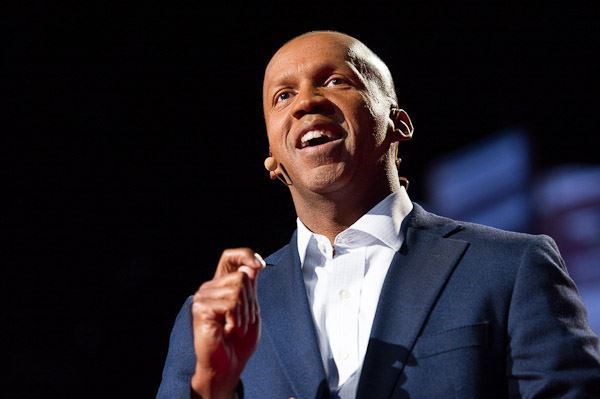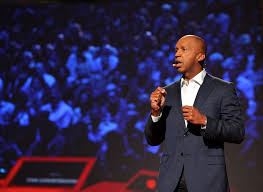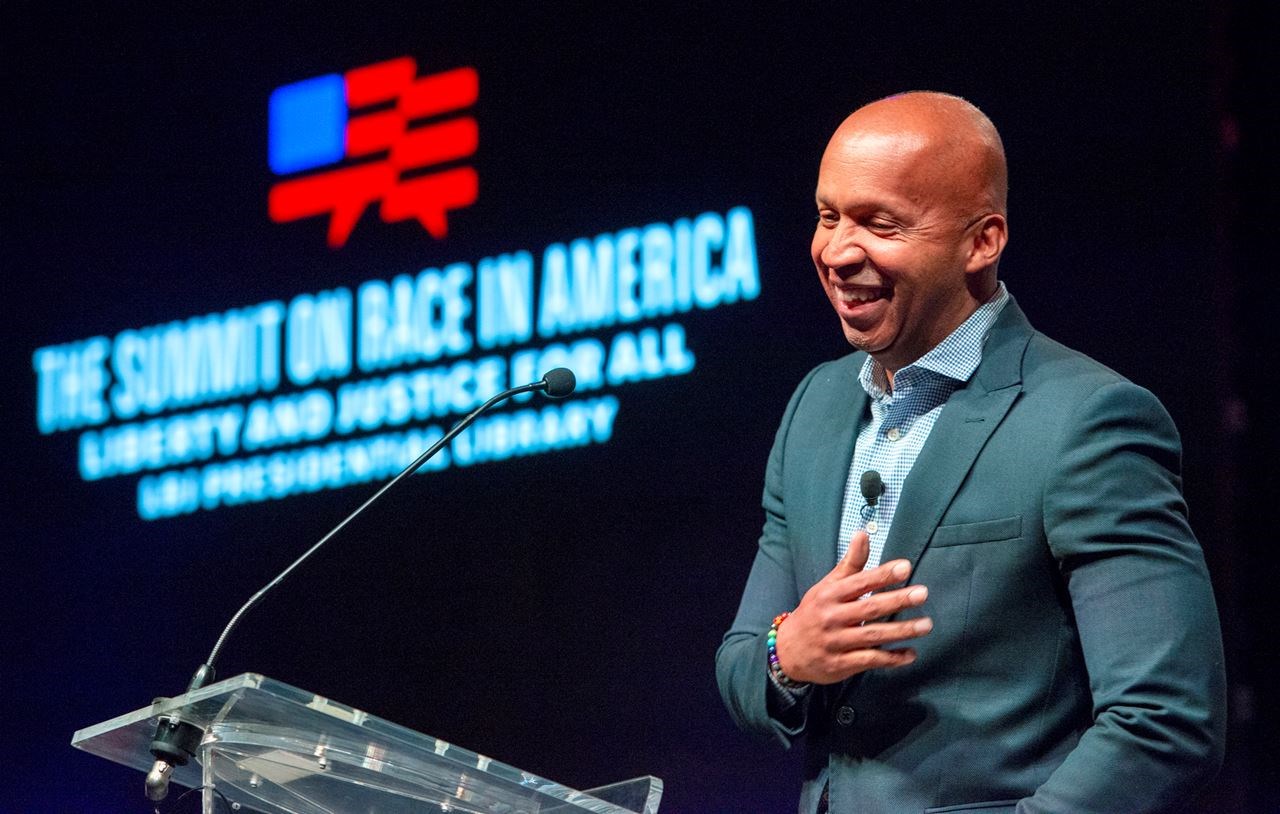“I've come to understand and to believe that each of us is more than the worst thing we've ever done. I believe that for every person on the planet. I think if somebody tells a lie, they're not just a liar. I think if somebody takes something that doesn't belong to them, they're not just a thief. I think even if you kill someone, you're not just a killer. And because of that, there's this basic human dignity that must be respected by law.” -Bryan Stevenson
 TED 2012wikimedia commons
TED 2012wikimedia commons
“My work has taught me a vital lesson: Each one of us is more than the worst thing we’ve ever done...I believe...we all need mercy, we all need justice...we all need some measure of unmerited grace” (Stevenson 17-18). With these compassionate beliefs, Bryan Stevenson asserted that humans are complex beings that cannot be defined by a single action, even if it is a heinous action, and, more importantly, that humans are capable of atonement and redemption. He believes that people should offer humility and forgiveness to one another because communities can become stronger when they nurture kindness instead of punishment. As an African American lawyer who fights for inmates on death row, Bryan Stevenson illustrates heroism because he perseveres through tough cases for the falsely condemned, advocates for criminal justice reforms, and, as a result, betters and saves many lives.
 TEDwikimedia commonsOne of Stevenson’s most important cases involved defending Walter McMillian: a case that not only sheds light on the deep-rooted racism within our criminal justice system, but also reveals Stevenson’s determination and dedication to fight for what's right. McMillian was a black man falsely accused of murdering a young white woman in 1986. Despite a rock-hard alibi backed by multiple corroborations from family and community members on the night of the murder, McMillian was arrested, convicted, and sentenced to death. Stevenson wrote that there was no evidence against McMillian “except that he was an African American man involved in an adulterous interracial affair, which meant he was reckless and possibly dangerous, even if he had no prior criminal history and a good reputation” (Stevenson 31). Interracial relationships were very frowned upon at the time; in fact, they weren’t widely legal until 1967. Although shocking by today’s standards, McMillian was framed for the crime because the police had no other leads and were desperate to solve this sad crime in order to appease the grieving white community. They not only bribed witnesses to lie but also intimidated witnesses who presented counter-evidence (Stevenson 92). Instead of finding the real murderer, the police made the job easier for themselves by blaming it on an innocent black man based on a flimsy eyewitness account. However, the prosecutors succeeded in blaming McMillian only because of the ingrained racism built into our criminal justice system, where he did not receive a jury of his peers nor received proper defense. According to Stevenson, “One out of three black men between the ages of 18 and 30 is in jail, in prison, on probation or parole” (“We need to talk about an injustice | Bryan Stevenson” contained in YouTube, uploaded by TED). Based on this shocking statistic, it would be easy to assume McMillian was guilty simply based on his skin color. In addition to having all possible evidence in McMillian’s favor thwarted by the police, Stevenson received multiple bomb and death threats in response to his work (Stevenson 178-180). The white people in McMillian’s community were outraged that someone was trying to defend an alleged murderer. Nevertheless, Stevenson continued to defend McMillian. Even though he put others' and his life in danger, Stevenson persevered because he believed this cause was more important than his own life.
TEDwikimedia commonsOne of Stevenson’s most important cases involved defending Walter McMillian: a case that not only sheds light on the deep-rooted racism within our criminal justice system, but also reveals Stevenson’s determination and dedication to fight for what's right. McMillian was a black man falsely accused of murdering a young white woman in 1986. Despite a rock-hard alibi backed by multiple corroborations from family and community members on the night of the murder, McMillian was arrested, convicted, and sentenced to death. Stevenson wrote that there was no evidence against McMillian “except that he was an African American man involved in an adulterous interracial affair, which meant he was reckless and possibly dangerous, even if he had no prior criminal history and a good reputation” (Stevenson 31). Interracial relationships were very frowned upon at the time; in fact, they weren’t widely legal until 1967. Although shocking by today’s standards, McMillian was framed for the crime because the police had no other leads and were desperate to solve this sad crime in order to appease the grieving white community. They not only bribed witnesses to lie but also intimidated witnesses who presented counter-evidence (Stevenson 92). Instead of finding the real murderer, the police made the job easier for themselves by blaming it on an innocent black man based on a flimsy eyewitness account. However, the prosecutors succeeded in blaming McMillian only because of the ingrained racism built into our criminal justice system, where he did not receive a jury of his peers nor received proper defense. According to Stevenson, “One out of three black men between the ages of 18 and 30 is in jail, in prison, on probation or parole” (“We need to talk about an injustice | Bryan Stevenson” contained in YouTube, uploaded by TED). Based on this shocking statistic, it would be easy to assume McMillian was guilty simply based on his skin color. In addition to having all possible evidence in McMillian’s favor thwarted by the police, Stevenson received multiple bomb and death threats in response to his work (Stevenson 178-180). The white people in McMillian’s community were outraged that someone was trying to defend an alleged murderer. Nevertheless, Stevenson continued to defend McMillian. Even though he put others' and his life in danger, Stevenson persevered because he believed this cause was more important than his own life.
 The Summit on Race in America https://www.flickr.com/photos/lbjlibrarynow/46660176785/in/album-72157706440487451/In addition to defending wrongly condemned inmates, Stevenson also advocates for reforms in the justice system. As of 2015, he has saved the lives of one-hundred-fifteen male inmates on death row by addressing serious issues in the justice system ("Bryan Stevenson." Contemporary Black Biography). Some examples are illegal investigation, racism, discrimination, and more. By creating reforms for the justice system, he managed to help many people, including McMillian. After a long and hard legal battle, Stevenson won McMillian’s case, enabling a rightfully innocent man to walk out of prison (Stevenson 196). If Stevenson had not taken his case, McMillian would have been unfairly and tragically executed. Stevenson took action to make the justice system more fair for minorities by addressing flaws within it.
The Summit on Race in America https://www.flickr.com/photos/lbjlibrarynow/46660176785/in/album-72157706440487451/In addition to defending wrongly condemned inmates, Stevenson also advocates for reforms in the justice system. As of 2015, he has saved the lives of one-hundred-fifteen male inmates on death row by addressing serious issues in the justice system ("Bryan Stevenson." Contemporary Black Biography). Some examples are illegal investigation, racism, discrimination, and more. By creating reforms for the justice system, he managed to help many people, including McMillian. After a long and hard legal battle, Stevenson won McMillian’s case, enabling a rightfully innocent man to walk out of prison (Stevenson 196). If Stevenson had not taken his case, McMillian would have been unfairly and tragically executed. Stevenson took action to make the justice system more fair for minorities by addressing flaws within it.
Stevenson also improves the lives of prison inmates and children by advocating for their rights. Some of the issues he advocates for improvement involved “suicide, prisoner-on-prisoner violence, inadequate medical care, staff abuse, and guard violence...” (Stevenson 35). Stevenson and his organization work on many cases regarding guard abuse and cruel and unusual punishments. He addresses these issues and policies are changed, which results in better treatment of prisoners. Stevenson also challenges the law of life without parole for non-homicidal crimes committed by adolescents as young as thirteen. This means that children were tried in an adult courtroom and sent to live the rest of their life in prison. Stevenson challenged this law because he met many adults who committed crimes as teenagers but learned from their mistakes. Once these teens become older, they wondered why they had acted violently and deeply regretted their decisions but had no way to redeem themselves and start a new life. He argued that this sentence was a cruel and unusual punishment because adolescents are different from adults, as they have a higher capacity to change and learn from their mistakes (Hedges, “NEW LIFE”). In 2012, the Supreme Court agreed with this argument and banned life without parole for children who committed any crime (Stevenson 243).
Stevenson’s journey illustrates that courage can conquer adversity, advocacy can result in reforms, and using one’s voice can improve and save many lives. He overcomes death threats and bomb threats, speaks out against injustices, saves lives, and creates reforms to better the lives of children in the justice system. Bryan Stevenson is a hero to me because he changed my perspective on death sentences and made me rethink how I see and define people. I used to believe that criminals behind bars were defined by their crimes and that they were rightfully punished for their actions. However, he opened my eyes to see the human behind that label, because there is more to every person than the label society gave them. Humans are complex creatures that are not just good or evil, but a mixture of both, because that is human nature. Although some criminals will continue to exploit the compassion of people who think they deserve a second chance, most can learn from their mistakes and contribute beautiful and meaningful actions in society, if we can see the humanity in them and offer a chance. I agree with Stevenson’s viewpoint that communities guided by compassion and kindness are stronger than ones guided by punishment.
Page created on 2/10/2020 12:15:23 AM
Last edited 2/26/2020 8:19:32 PM
